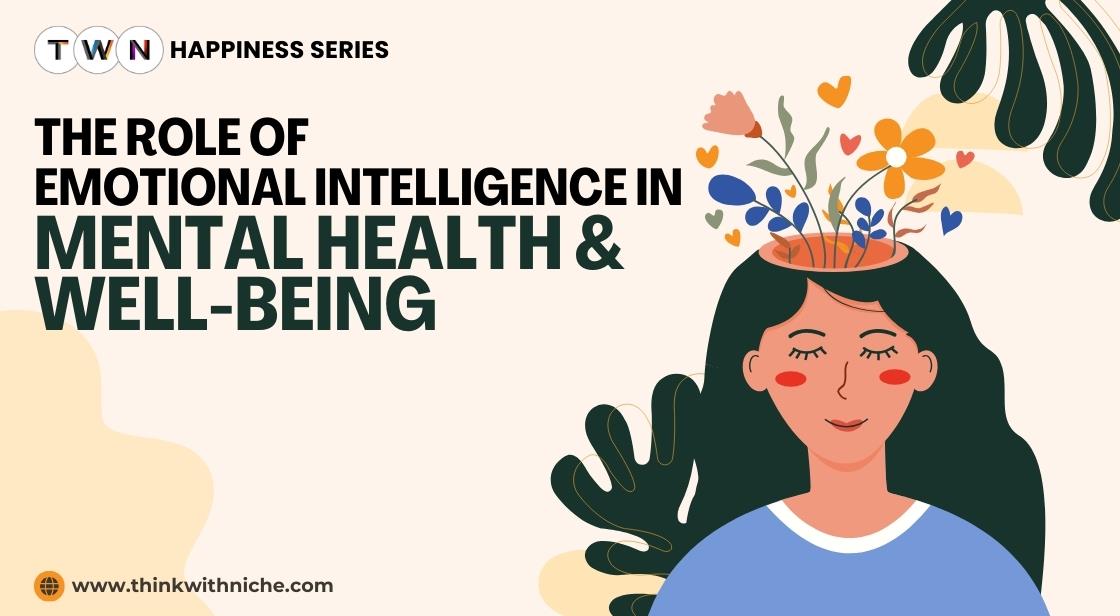The Role of Emotional Intelligence in Mental Health and Well-being

Blog Post
Emotional intelligence (EI) is a pivotal concept in understanding the intricate interplay between emotions, mental health, and overall well-being. At its essence, EI involves the ability to recognize, understand, manage, and utilize emotions effectively in oneself and in others.
Unlike cognitive intelligence, which focuses on intellectual abilities, EI centers on emotional awareness and regulation, playing a critical role in shaping how individuals navigate life's challenges and relationships.
The significance of EI in mental health cannot be overstated. Individuals with high emotional intelligence are often better equipped to handle stress, navigate social complexities, and make informed decisions.
This ability to manage emotions contributes to greater resilience, allowing individuals to bounce back from adversities more swiftly. Furthermore, EI fosters empathy, enhancing interpersonal relationships by promoting understanding and cooperation among individuals.
Research has consistently shown that high emotional intelligence is linked to lower levels of anxiety, depression, and other mental health issues. By fostering a deeper understanding of one's emotional state and the emotions of others, EI provides a robust framework for addressing mental health challenges proactively.
This is particularly important in a world where mental health concerns are increasingly prevalent, underscoring the need for emotional competencies that can support psychological well-being.
Moreover, the development of EI skills can lead to improved self-esteem, better stress management, and overall life satisfaction. As people become more adept at recognizing and regulating their emotions, they can cultivate a more balanced and fulfilling life.
Emotional intelligence is a crucial factor in promoting mental health and well-being, offering tools and strategies that enhance emotional resilience, interpersonal relationships, and overall life satisfaction.
Understanding Emotional Intelligence: Key Concepts and Applications
Emotional Intelligence plays a crucial role in various aspects of life, including personal relationships, professional success, and overall well-being. It enables individuals to navigate social complexities, make informed decisions, and cultivate healthier relationships both at work and in personal life. Developing EI involves self-awareness, practice, and a commitment to understanding and managing emotions in constructive ways.
What is Emotional Intelligence?
Emotional Intelligence (EI) refers to the ability to understand and manage one's own emotions, as well as to perceive and navigate the emotions of others effectively. Coined and popularized by psychologists such as Daniel Goleman, EI encompasses a set of skills that enable individuals to recognize emotions in themselves and others, discern between different feelings, and use this emotional information to guide thinking and behavior.
Explanation of the five components of Emotional Intelligence
-
Emotional Awareness: The foundational component of EI involves recognizing and understanding one's own emotions. This includes being able to identify emotions as they arise and understanding their impact on thoughts and actions.
-
Self-Regulation: Refers to the ability to manage and control one's emotions and impulses. Individuals high in self-regulation can adapt to changing situations, maintain composure under stress, and avoid impulsive or reactive behaviors.
-
Empathy: The capacity to recognize and understand the emotions and perspectives of others. Empathy involves actively listening, showing sensitivity, and demonstrating genuine concern for others' feelings.
-
Motivation: Involves harnessing emotions to achieve goals, persist in the face of setbacks, and maintain a positive outlook. Motivated individuals often exhibit enthusiasm, drive, and a strong internal drive to succeed.
-
Social Skills: The ability to manage relationships effectively and build rapport with others. This includes communication skills, conflict resolution, teamwork, and the ability to influence and inspire others.
Importance of Emotional Intelligence in Personal and Professional Contexts
Emotional intelligence plays a crucial role in both personal and professional spheres:
-
Personal Context: EI enhances self-awareness and self-confidence, leading to better decision-making and interpersonal relationships. Individuals with high EI tend to have healthier personal relationships and exhibit resilience in the face of adversity.
-
Professional Context: In the workplace, EI is highly valued as it fosters effective leadership, teamwork, and communication. Employees with strong EI skills are better equipped to manage stress, navigate conflicts, and collaborate productively.
Exploring How Emotional Intelligence Influences Mental Health and Overall Well-being
The thesis explores the profound impact of emotional intelligence on mental health and overall well-being. By understanding and developing EI skills, individuals can enhance their psychological resilience, manage stress more effectively, and cultivate healthier relationships.
Moreover, EI contributes to personal satisfaction and professional success by promoting emotional stability, adaptability, and interpersonal competence. This article will delve into specific examples, research findings, and practical strategies to illustrate the significant role of EI in promoting mental health and enhancing overall quality of life.
Examples of Emotional Intelligence in Everyday Life
-
Self-Awareness: Recognizing when you need a break to manage stress effectively.
-
Self-Regulation: Controlling impulses to avoid reacting impulsively in stressful situations.
-
Motivation: Setting ambitious goals and persisting despite obstacles to achieve personal growth.
-
Empathy: Understanding a colleague's perspective during a team meeting and offering constructive feedback.
-
Social Skills: Building rapport with new acquaintances at a networking event to forge professional connections.
Also Read: How Creative Activities Boost Happiness and Productivity
Emotional Intelligence and Mental Health
The ability to identify, comprehend, and control one's own emotions as well as to sense and affect those of others is referred to as emotional intelligence (EI). This skill set plays a crucial role in mental health by shaping how individuals navigate and respond to challenges, stressors, and interpersonal relationships.
Relationship between Emotional Intelligence and Mental Health
Research consistently demonstrates a positive correlation between higher levels of emotional intelligence and better mental health outcomes. Individuals with high EI tend to exhibit greater emotional resilience, which enables them to bounce back from setbacks and adversities more effectively. They are better equipped to manage stress, regulate their emotions, and maintain a balanced perspective during difficult situations.
How High Emotional Intelligence Contributes to Resilience and Coping Mechanisms
EI enhances resilience by fostering adaptive coping mechanisms. People with high EI skills can accurately identify their emotions and understand their triggers, allowing them to implement effective strategies for managing stress. They are adept at problem-solving and decision-making under pressure, which contributes to their ability to maintain psychological well-being amidst challenges.
Studies Linking EI to Reduced Stress, Anxiety, and Depression
Numerous studies have highlighted the beneficial impact of EI on reducing symptoms of stress, anxiety, and depression. Individuals with higher EI are less likely to experience prolonged negative emotions or to be overwhelmed by stressors. They exhibit greater emotional stability and are better able to regulate their mood, resulting in lower levels of anxiety and depression.
For example, research has shown that EI training interventions can lead to improvements in mental health outcomes among various populations, including students, professionals, and individuals in clinical settings. These interventions typically focus on enhancing emotional awareness, empathy, and effective communication skills, all of which contribute to better emotional regulation and mental well-being.
Impact of Emotional Intelligence (EI) on Personal Well-being
Emotional Intelligence (EI) plays a crucial role in enhancing personal well-being by influencing self-awareness, self-regulation, and interpersonal relationships. Here's a breakdown of how EI contributes to personal growth and happiness:
Enhancing Self-awareness
EI enhances self-awareness by enabling individuals to recognize and understand their emotions, thoughts, and behaviors. People with high EI can accurately assess their strengths and weaknesses, leading to better self-esteem and confidence. For example, someone with strong EI might recognize when they are feeling stressed or overwhelmed, allowing them to take proactive steps to manage their emotions effectively.
Improving Self-regulation
Self-regulation is another key aspect of EI, involving the ability to control and manage one's emotions, impulses, and behaviors. Individuals with developed self-regulation skills can adapt to challenging situations calmly and make thoughtful decisions. This capability not only reduces stress but also promotes resilience in the face of adversity. For example, someone with high EI might practice mindfulness or relaxation techniques to maintain emotional equilibrium during stressful times.
Case Studies on Improved Personal Relationships
Numerous case studies illustrate how EI positively impacts personal relationships. For example, individuals with high EI tend to exhibit empathy and understanding towards others' emotions, fostering deeper connections and trust. Such individuals are better at resolving conflicts constructively and maintaining harmonious relationships both at home and in the workplace. Studies have shown that couples with higher levels of EI experience less conflict and greater satisfaction in their relationships.
Practical Tips for Developing EI Skills
Developing EI skills requires intentional effort and practice. Here are some practical tips:
-
Practice mindfulness: Engage in mindfulness meditation or breathing exercises to increase self-awareness and emotional regulation.
-
Seek feedback: Actively solicit feedback from trusted friends or mentors to gain insights into your strengths and areas for improvement.
-
Enhance empathy: Practice empathetic listening and try to understand others' perspectives and emotions.
-
Manage stress: Develop healthy coping mechanisms such as exercise, hobbies, or talking to a counselor to manage stress effectively.
Emotional Intelligence in Professional Settings
In today's competitive and interconnected world, Emotional Intelligence (EI) plays a crucial role in shaping workplace dynamics and individual career trajectories. EI refers to the ability to recognize and manage one's own emotions, as well as understand and influence the emotions of others.
Importance of EI in the Workplace and Career Success
Emotional Intelligence is increasingly recognized as a critical factor in achieving success in the workplace. Beyond technical skills and qualifications, EI enables individuals to navigate complex social interactions, resolve conflicts effectively, and adapt to organizational changes. Employees with high EI are often better equipped to handle workplace pressures, communicate persuasively, and build lasting relationships with colleagues, clients, and stakeholders.
How EI Fosters Effective Leadership and Teamwork
Effective leadership requires more than just technical expertise; it necessitates strong interpersonal skills and the ability to inspire and motivate others. Leaders with high EI exhibit empathy, understanding, and emotional resilience, which are essential for fostering a positive work environment and achieving collective goals. They can connect with team members on a deeper level, cultivate trust, and lead by example, thereby enhancing team cohesion and productivity.
Examples of Companies or Organizations Promoting EI Among Employees
Numerous forward-thinking companies and organizations prioritize EI development among their workforce. For example, Google emphasizes EI through programs like Search Inside Yourself, which integrates mindfulness and emotional intelligence training to enhance employee well-being and performance. Similarly, LinkedIn offers EI workshops and training sessions aimed at improving leadership capabilities and interpersonal skills among its employees.
Another example is Microsoft, which incorporates EI assessments and coaching into its leadership development programs to cultivate emotionally intelligent leaders who can effectively manage diverse teams and drive innovation. These initiatives not only benefit individual career growth but also contribute to organizational success by fostering a culture of collaboration, empathy, and continuous improvement.
Types of Emotions: Positive and Negative
Positive Emotions: Positive emotions include feelings like happiness, joy, gratitude, love, contentment, and amusement. These emotions typically contribute to a sense of well-being, satisfaction, and positive interpersonal interactions. They can enhance resilience, creativity, and overall psychological health.
Negative Emotions: Negative emotions encompass feelings such as sadness, anger, fear, guilt, shame, and anxiety. These emotions are often associated with discomfort, distress, and challenges in coping with situations.
While they can be unpleasant, negative emotions serve evolutionary purposes, signaling potential threats or prompting necessary adjustments in behavior. Managing negative emotions effectively is crucial for maintaining mental health and achieving emotional balance.
Understanding both positive and negative emotions is essential for emotional intelligence, as it enables individuals to navigate their emotional landscape with greater awareness and responsiveness.
Importance of Mindfulness, Empathy, and Active Listening in Improving EI
Mindfulness cultivates awareness of one's emotions and responses, promoting better self-regulation and stress management. It enables individuals to stay present and focused, enhancing decision-making and reducing impulsivity.
Empathy, the ability to understand and share others' feelings, is crucial for building strong interpersonal connections and fostering positive relationships. It promotes compassion and inclusivity, essential in diverse personal and professional environments.
Active listening involves giving full attention to the speaker, understanding both verbal and non-verbal cues. It demonstrates respect and empathy, facilitating effective communication and conflict resolution.
Incorporating EI Training into Educational Curricula and Workplace Development Programs
Educational institutions and workplaces can integrate EI training to cultivate these skills from an early age through adulthood:
-
School Programs: Introduce EI concepts in school curricula, teaching students emotional awareness and social skills. Implement peer mentoring and conflict resolution programs to practice EI in real-life scenarios.
-
Workplace Initiatives: Offer EI workshops and training sessions for employees at all levels. Provide opportunities for self-assessment and feedback, encouraging continuous improvement in EI competencies. Foster a supportive workplace culture that values emotional intelligence and promotes psychological safety.
By implementing these strategies and emphasizing the importance of mindfulness, empathy, and active listening, individuals can enhance their emotional intelligence. These skills not only contribute to personal well-being but also strengthen relationships and foster a positive environment in both educational and professional settings.
Challenges and Limitations in Developing Emotional Intelligence
Developing Emotional intelligence (EI) can pose several challenges, hindering individuals from fully harnessing its benefits:
Personal Resistance and Comfort Zones
Many individuals may find it challenging to step out of their comfort zones and confront their emotions. Developing EI requires self-awareness and the willingness to acknowledge and manage one's own emotions, which can be uncomfortable for some.
Time and Patience
Improving EI is a gradual process that requires consistent effort and practice over time. In today's fast-paced world, individuals may struggle to allocate sufficient time and energy to develop these skills amidst other responsibilities and priorities.
Complexity of Emotions
Emotions are multifaceted and can be complex to understand and regulate. Individuals may encounter difficulties in accurately identifying and interpreting their emotions, which is crucial for effective EI development.
Cultural and Contextual Factors Influencing EI Development
Cultural Norms and Values
Cultural backgrounds significantly influence how emotions are expressed, perceived, and managed. Practices and norms around emotional expression may vary widely across cultures, impacting individuals' approaches to developing EI.
Social Environment
Family dynamics, societal expectations, and workplace cultures also play a role in shaping EI development. Supportive environments that encourage emotional expression and empathy can facilitate EI growth, while restrictive or unsupportive environments may hinder it.
Addressing Common Misconceptions about Emotional Intelligence
Misconception: EI is Fixed and Innate
One common misconception is that emotional intelligence is innate and cannot be developed. In reality, EI is a set of skills that can be learned and improved through practice and deliberate effort.
Misconception: EI Equals Being Overly Emotional
Another misconception is that individuals with high EI are overly emotional or lack control over their feelings. In contrast, EI involves the ability to understand and manage emotions effectively, which includes regulating emotions in appropriate ways.
Key Concepts of Emotional Intelligence
Emotional Intelligence (EI) is not just a static trait but a skill that can be developed and enhanced over time through various strategies and techniques. Here are key strategies for improving EI:
Techniques and Exercises for Developing EI Skills
Self-Awareness Exercises: Start by identifying and labeling your emotions. Keep a journal to track your emotional responses to different situations. Reflect on your strengths and weaknesses in managing emotions.
Self-Regulation Practices: Practice mindfulness and relaxation techniques such as deep breathing and meditation to manage stress and emotional reactions effectively. Set realistic goals and develop a plan to achieve them, fostering self-discipline.
Empathy Building: Engage in perspective-taking exercises to understand others' emotions and viewpoints. Actively listen to others without judgment, seeking to understand their feelings and experiences.
Social Skills Development: Improve your communication skills by practicing assertiveness, conflict resolution, and negotiation. Participate in group activities or volunteer work to enhance teamwork and cooperation.
Motivation
Intrinsic vs. Extrinsic Motivation
Intrinsic motivation stems from internal desires and personal satisfaction, such as enjoyment or a sense of accomplishment. Extrinsic motivation, on the other hand, involves external rewards or pressures, like money or recognition.
How Emotional Intelligence Fuels Motivation and Persistence
Emotional intelligence enhances motivation by fostering self-awareness and self-regulation. Individuals with high EI can effectively manage setbacks, stay focused on long-term goals, and find intrinsic satisfaction in their work. EI also enables them to empathize with others, build strong relationships, and draw motivation from collaborative efforts and positive interactions. This combination of internal drive and interpersonal skills boosts persistence and resilience in achieving both personal and professional aspirations.
Applications of Emotional Intelligence
Emotional intelligence (EI) has widespread applications that benefit individuals and organizations alike. Here are some key areas where emotional intelligence plays a crucial role:
Effective Communication: Emotional intelligence helps individuals communicate more effectively despite strong emotions. When we’re emotionally dysregulated, our ability to think clearly and address triggering situations is compromised. EI helps manage emotions during challenging conversations, leading to better communication and understanding.
Leadership Development: Leaders with high emotional intelligence create positive work environments, build strong relationships, and inspire their teams. They understand their own emotions and those of others, which enhances decision-making and team dynamics.
Conflict Resolution: EI enables individuals to navigate conflicts constructively. By recognizing emotions and empathizing with others, people can find common ground and resolve disagreements more effectively.
Stress Management: Emotionally intelligent individuals cope better with stress. They regulate their emotions, reducing the impact of stressors on their well-being.
Job Satisfaction and Productivity: Organizations that foster emotional intelligence experience higher job satisfaction among employees. When people feel understood and supported, they are more engaged and productive.
Reducing Group Stress: Teams with emotionally intelligent members handle stress collectively. They support each other, manage conflicts, and maintain a positive group atmosphere.
Personal Well-Being: EI contributes to overall life success. It’s linked to academic achievement, better decision-making, and improved relationships
Benefits of Emotional Intelligence (EI) in Various Aspects of Life
-
Work through issues by applying both reason and emotion.
-
When circumstances change, remain adaptable.
-
Assist others in communicating their requirements.
-
React to challenging people in a measured and composed manner.
-
Maintain a cheerful and upbeat attitude
-
Show compassion, sensitivity, and concern for other people.
-
Always be seeking ways to better the organization and ourselves.
-
improve our dialogues and exchanges with individuals from diverse cultural backgrounds.
You May Like
EDITOR’S CHOICE












